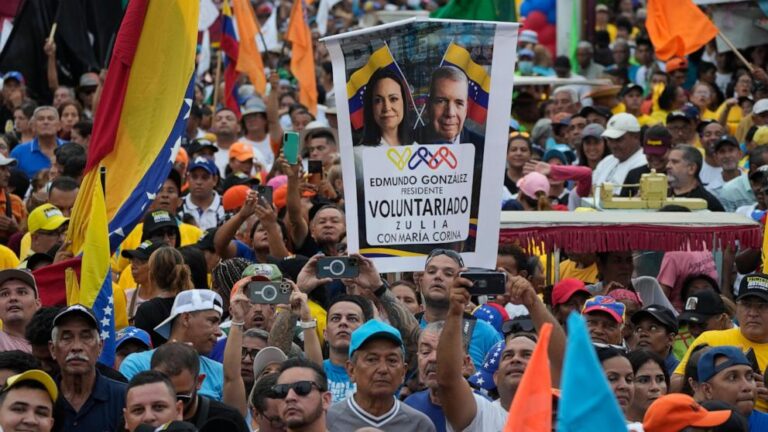The past two months have been like no other for Edmundo González Urrutia: He gave political speeches, shook hands and waved from the top of a truck to cheering crowds across Venezuela.
CARACAS, Venezuela — The past two months have been like nothing Edmundo Gonzalez Urrutia has experienced before: He’s given political speeches, shook hands and waved from the top of a moving truck to cheering crowds across Venezuela. He’s also ditched his ambassadorial title to become a presidential candidate.
At 74, Gonzalez’s life has changed dramatically, transforming him from a little-known, devout grandfather into a household name, and he could make history on Sunday if he defeats President Nicolas Maduro in a highly anticipated election that will mark the first serious electoral challenge the ruling party faces in decades.
“The words I’ve been told over and over again are: ‘You are my last hope,'” Gonzalez told reporters Thursday about his supporters. “I want to say you are hope. You have given me the strength to face what is arguably the most unequal electoral contest in the history of Venezuela.”
Gonzalez is running on behalf of the Unity Platform, Venezuela’s main opposition coalition, but until April he never imagined he would run for public office, let alone presidency.
The coalition selected her in April as a last-minute replacement for Maria Corina Machado, a strong opposition figure who had been barred from running for any public office for 15 years by the Maduro-controlled Supreme Court. Machado, a former member of parliament, won a landslide victory in opposition primary elections in October with more than 90% of the vote.
After being blocked from running, Machado chose a university professor as his replacement, but the pro-ruling National Electoral Commission also barred her from registering, so political newcomer Gonzalez was chosen.
There are eight candidates running against Maduro in Sunday’s vote, but Gonzalez is the only one who poses a threat to the president’s third term ambitions.
Even among Venezuela’s opposition parties, few had heard of the former diplomat before he was announced as the coalition’s candidate. Before joining Machado’s campaign, Mr. Gonzalez served as Mr. Machado’s surrogate, allocating about a minute of his speaking time to him, portraying him as a loyal family man and urging his supporters to vote for him.
Gonzalez began his career as an aide to the Venezuelan ambassador to the United States, and has served in Belgium and El Salvador, as well as serving as the Algerian ambassador in Caracas.
His last post was as ambassador to Argentina during the early years of the government of Maduro’s predecessor and mentor, Hugo Chavez. More recently, he has worked as an international relations consultant, writing about recent political developments in Argentina and a history book about Venezuela’s foreign minister during World War II.
His time living in El Salvador and Algeria overlapped with periods of armed conflict in those countries, and at one point his location was tracked by local Salvadorans, who even made threatening phone calls to his home, saying they knew Gonzalez had just returned home.
He had just returned to Caracas, Venezuela’s capital, from a trip to Europe to visit his daughter and grandchildren, when opposition leaders approached him about the idea of running. He accepted, but on a few conditions, including that his wife be happy with the decision. Not only did she agree, but she stood next to him on stages and trucks, waving to crowds of thousands, young and old, during campaign hours.
His characteristically soft-spoken tone and poker face, honed over his years as a diplomat, are the opposite of the loudmouth politician voters are accustomed to. Maduro and his allies saw his attitude as a sign of weakness and denounced him on state television and on the campaign trail. Such insulting language is one of many changes Gonzalez wants to see in Venezuela. In his short campaign, he has emphasized the decency he wants Venezuelans to experience again, from a minimum wage to reliable public services.
“We’ve had enough of the yelling and the insults. It’s time to rally,” Gonzalez told supporters.
A victory for Gonzalez would mark the end of 25 years in Venezuela under what Chavez called 21st-century socialism and policies he implemented after taking office in 1999. Gonzalez has not laid out his vision for his government, but that doesn’t seem to worry opposition supporters, many of whom believe the only vision that matters ahead of the election is one to defeat Maduro in Sunday’s vote.
“What’s happening? People no longer believe the story of socialism,” Leonardo Guerrero, a lay church leader in the western state of Barinas, said after a recent service, where the mass had to be held using battery-powered speakers after a power outage that lasted for hours.

